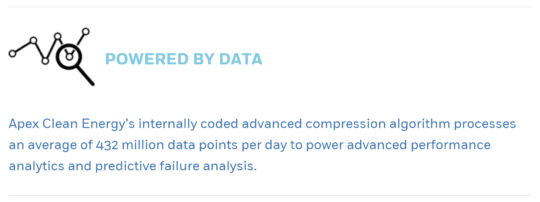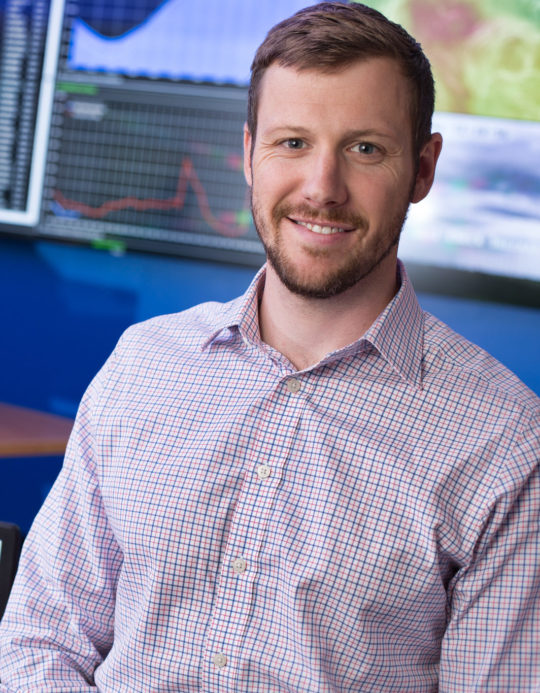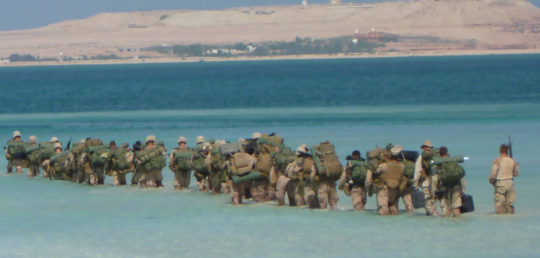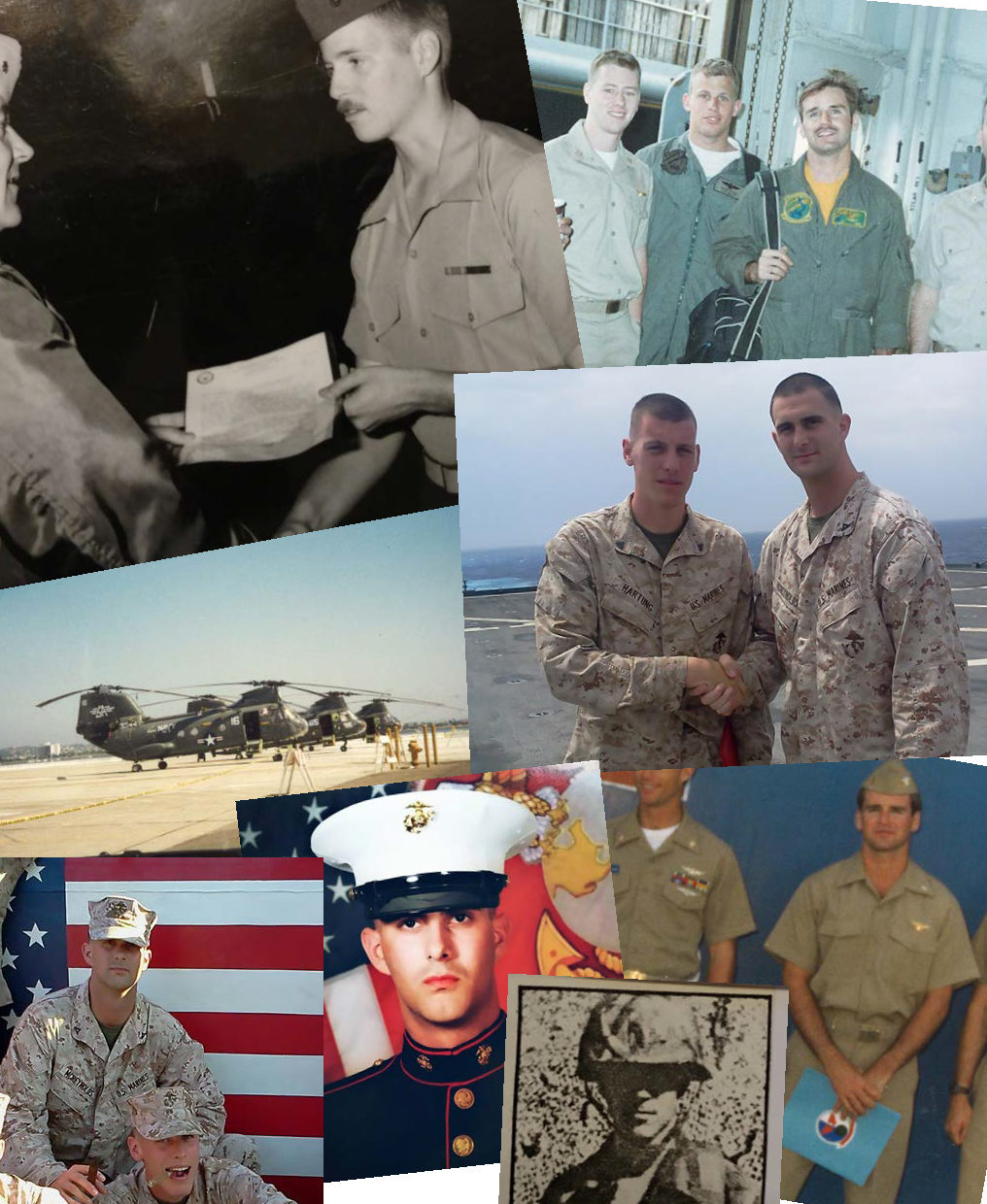Veterans: The Best in the Business
A certain subset of the population is particularly well suited for the high-pressure environment of Apex’s Remote Operations Control Center.
On one floor of Apex Clean Energy’s headquarters in Charlottesville, Virginia, there is an imposing room usually tinted some shade of blue and buzzing with state-of-the-art equipment.
Only a select few employees have access via a keycard swipe, which activates the frosted sliding glass doors and reveals a dazzling wall of data.
Welcome to the ROCC—Apex’s Remote Operations Control Center.
At any time of day, any day of the year, you’ll find at least one operator overseeing the room and minding the 629 turbines that Apex manages to make sure everything runs smoothly. Some days, it’s a 12-hour shift of waiting, watching, checking, and monitoring. But more often than not, the ROCC operators are working proactively to ensure optimal performance of every turbine on every site across a quickly expanding fleet.
“It’s one thing to sit and watch a series of computer banks and react if an alarm comes on,” says Dave Grant, Apex’s director of remote operations and SCADA technology. “But can you recognize something that may not be an alarm state because of additional moving parts, but that’s moving in the direction of alarming?”
The job is demanding. It’s high pressure and high stakes, and it’s definitely not for everyone.
The Military Mentality
Since Grant joined Apex in 2014, when the ROCC was an unfinished space and he was one of two on the asset management team, he’s learned that a certain subset of the population is particularly well suited for the job.
“The thing that can only be taught through time and experience—like serving in our armed forces—is the self-discipline to be dialed in at 0200 hours not being distracted by social media or wayward thoughts,” says Grant. “We are constantly alert, constantly seeking improvement, and those characteristics are driving more wind farms to our Asset Management program.”
Grant learned that self-discipline when he joined the U.S. Marine Corps just four days after his seventeenth birthday.
He’s found that other veterans usually have a similar mentality and the skills that day-to-day work at the ROCC requires.
“It can go from zero to really fast, really quick,” says Aaron Strobel, ROCC operator and former aviation life support technician for the U.S. Navy.

Here’s just one example of a night at the ROCC: at 3:41 a.m., an operator makes an adjustment at Hoopeston Wind in Illinois to optimize a turbine’s performance. Thirty seconds later, the first strike of a powerful lightning storm hits the ground at Kay Wind in Oklahoma, and the operator begins following Apex’s lightning-monitoring system closely. The operator must manage each distinct situation that arises within a system that is collecting, storing, and auto-analyzing over 432 million bits of data every 24 hours.
“The ability to handle pressure, to make the best decision you can with whatever information you have, just dealing with the things that come up pretty quick that we have to react to—that definitely was a big help, and that’s something that the military instilled in me at eighteen years old,” Strobel says. “There’s a saying, ‘paralysis through analysis,’ meaning if you wait on every single little detail, it might be too late.”

“The military instills a mentality of contributing to the success of the team and the success of the mission, and that transfers over to many aspects of our work.”
Daniel Wetzel, an asset manager at the ROCC and former captain in the Marine Corps, agrees: “Veterans tend to have the mindset that if they see a problem and they don’t have a set procedure for it, they’re not going to just throw their hands up in the air; they’re going to continue to work around it and troubleshoot and go outside of what they are typically supposed to do in order to solve the problem.”

And for these ROCC operators, not acting simply isn’t an option. The job requires them taking the appropriate action 100% of the time—or risking a regulatory violation and a penalty of up to $1 million. These high stakes can be reminiscent of days spent serving our nation.
“Everything you do is in a high-intensity, stressful situation. You don’t have time to panic. You don’t have time to think about what’s going to happen. You just react,” says Chris McReynolds, lead ROCC operator and former sergeant in the Marine Corps. “Being through a lot of that and then coming over to Apex, to me, it’s a lot easier to handle a high-pressure situation in here.”
Veteran-led at Every Level
Less than 10 percent of the population has served in the military, which means that the vast majority of those in hiring positions have never served and may not necessarily understand how military skill sets transfer.
But the Apex team—the entire company, not just at the ROCC—is veteran-led.
Mark Goodwin, president and CEO, served as a pilot in the Navy and completed three tours in the Persian Gulf.
“Apex is committed to seeking out the best candidates in the industry, and oftentimes those candidates we look for are veterans,” says Goodwin. “The military instills a mentality of contributing to the success of the team and the success of the mission, and that transfers over to many aspects of our work, including operations, technology, construction, and development.”

Crafting a Culture of Comradery
Talk to each of the veterans in the ROCC, and you’ll learn they have a lot more in common than their military backgrounds. When you ask each what their favorite part about working there is, they all have the same answer: each other.
“My favorite thing is the teamwork, comradery,” says Strobel. “It’s very important to me personally that I know the people I work with.”
But this work environment is no accident.
“Veterans often miss the comradery when they get out of the Marine Corps or the Navy or the Air Force or Army. Replicating that atmosphere in the ROCC is important,” says Grant. “That way you have teamwork with everybody. Everybody’s trying to watch out for each other.”

